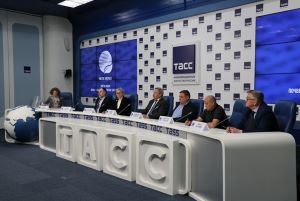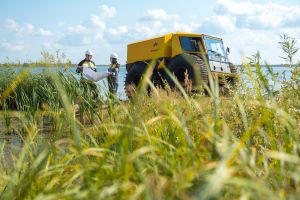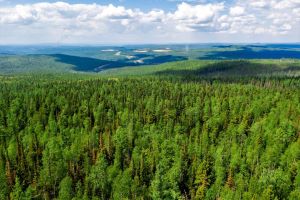Rosneft to reclaim 100% of «historical heritage» land by 2035

By 2035, Rosneft will reclaim all land in its operating regions with accumulated environmental damage, including from the Soviet era. This was stated by representatives of the Company at the Clean Earth: Soils as the Basis for Russia’s Ecological Systems round table, organised by the Clean Future National Ecological Platform. The Company has also summarised the results of the large-scale environmental remediation activities already carried out: 2,711 hectares of «historical heritage» land have been remediated over a 10-year period (2013-2022).
As part of Rosneft’s 2030 strategy, the Company is improving its approach to environment-oriented management, increasing the scale of environmental activities and securing the necessary investments. Rosneft is focused not only on making its business more environmentally friendly and minimising its impact on the environment, but also on achieving a cumulative positive impact on the ecosystem.
 A key element of this work is the conservation of biodiversity, which cannot be achieved without creating the conditions for restoring the ecological functions of soils and biological productivity. The complete elimination of «historical» accumulated pollution by 2035 is of strategic importance to the Company’s sustainability activities and reflects Rosneft’s position as a leader of Russia’s green agenda.
A key element of this work is the conservation of biodiversity, which cannot be achieved without creating the conditions for restoring the ecological functions of soils and biological productivity. The complete elimination of «historical» accumulated pollution by 2035 is of strategic importance to the Company’s sustainability activities and reflects Rosneft’s position as a leader of Russia’s green agenda.
At the round table, Rosneft representatives spoke about a range of methods and technologies developed by the Company’s ecologists to restore the biological productivity of soils in northern latitudes. These include winter reclamation technology, the use of specialised equipment for working in wetlands: amphibious excavators on pontoon-tracked chassis, multi-purpose snowmobiles of various modifications and small transporters with high manoeuvrability.
Also during the round table, representatives from Rosneft and the Russian Arctic National Park presented the results of the joint comprehensive Clean Arctic project to study the impact of Soviet-era economic activities on Arctic ecosystems. After a three-year study, scientists have identified the environmentally optimal methodology for dealing with oil pollution in the Arctic wilderness. In addition, experts have discovered indigenous micro-organisms that break down hydrocarbons most effectively in soils at low temperatures (2-6°C). This discovery has considerable potential, not only from a scientific point of view, but also from a practical one: the highly active cultures identified in Arctic soils can be used to produce biopreparations for soil treatment.
 The Clean Earth: Soils as the Basis for Russia’s Ecological Systems round table is timed to coincide with International Earth Day. The holiday was established by the United Nations General Assembly to draw attention to the protection of the environment and the preservation of the ecological balance of our planet. The event was attended by representatives of leading research centres, including the V.V. Dokuchaev Soil Science Institute, Lomonosov Moscow State University, the Timiryazev Russian State Agrarian University, the Russian Arctic National Park, the Innopraktika non-state development institute, and others. Lomonosov Moscow State University, the Timiryazev Russian State Agrarian University, The Russian Arctic National Park, the Innopraktika non-state development institute, and others. During the discussion, experts looked at current issues in nature management and soil science, land restoration and reclamation, unlocking their absorptive potential and finding the best forms of collaboration between the scientific and business communities in the field of environmental security.
The Clean Earth: Soils as the Basis for Russia’s Ecological Systems round table is timed to coincide with International Earth Day. The holiday was established by the United Nations General Assembly to draw attention to the protection of the environment and the preservation of the ecological balance of our planet. The event was attended by representatives of leading research centres, including the V.V. Dokuchaev Soil Science Institute, Lomonosov Moscow State University, the Timiryazev Russian State Agrarian University, the Russian Arctic National Park, the Innopraktika non-state development institute, and others. Lomonosov Moscow State University, the Timiryazev Russian State Agrarian University, The Russian Arctic National Park, the Innopraktika non-state development institute, and others. During the discussion, experts looked at current issues in nature management and soil science, land restoration and reclamation, unlocking their absorptive potential and finding the best forms of collaboration between the scientific and business communities in the field of environmental security.
The scientists noted that the lack of approved standards for the permissible residual content of oil products in soils in most Russian regions does not allow effective remediation of oil-contaminated areas or objective acceptance of land after remediation. Specialists from the Company’s scientific department, including specialists from the SamaraNIPIneft Corporate Institute, who have successful experience in this type of work, actively participate in the process of establishing such standards.
Rosneft
Information Division
April 24, 2023